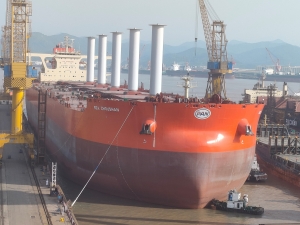


(Posted on 17/05/21)
The fleet of ships serving Vale is to include the first large ore carrier in the world equipped with rotor sails. The VLOC (Very Large Ore Carrier) is a Guaibamax, with 325,000 tons of capacity. There are five sails installed along the vessel that will allow a gain in efficiency of up to 8% and a consequent reduction of up to 3,400 tons of CO2 equivalent per ship per year. If the pilot proves efficient, it is estimated that at least 40% of the fleet will be able to use the technology, which would result in a reduction of almost 1.5% of Vale's annual iron ore maritime transport emissions.
Rotor sails are cylindrical rotors, four meters in diameter and 24 meters high - equivalent to a seven-story building. During operation, the rotors rotate at different speeds, depending on the environmental and operational conditions of the ship, to create a pressure difference in order to move the ship forward, due to a phenomenon known as the Magnus effect.
With Vale as project leader, the installation of the technology, provided by Finnish manufacturer Norsepower, had the partnership of Korean shipowner Pan Ocean to apply it in one of its VLOCs at Vale's service. The Chinese design company Shanghai Ship and Design Research Institute (SDARI) was responsible for vessel design and integration with sail. The Chinese shipyard New Times Shipbuilding built the ship already adapted to receive the sails, which were installed at another shipyard, PaxOcean Engineering Zhoushan, also located in China. The Guaibamax is leaving China in the next days for Brazil, where it will receive the first shipment of iron ore at one of Vale's ports in the country. On average, the trip takes 40 days.
"Our naval engineering team has been studying the use of wind propulsion technology for our business since 2016. With the Ecoshipping program we have developed several cooperation partnerships with ITV (Vale Institute of Technology), universities and laboratories in Brazil and Europe. For this project, the purpose was to evaluate the best operating conditions of rotor sails in our contracted fleet, and also validate the gains of this technology in terms of reducing fuel consumption and CO2 emissions," explains Vale's s shipping technical manager, Rodrigo Bermelho.
There are five sails installed along the vessel that will allow a gain in efficiency of up to 8% and a consequent reduction of up to 3,400 tons of CO2 equivalent per ship per year
The ship chosen was already contracted to be built and the time between detailed design to manufacture and installation of the equipment was one year. In addition to laboratory tests and numerical analyses, the technicians studied the incidence of winds on the Brazil-China route. "We realized that we have a competitive advantage over our competitors: the Brazil-Asia route has more wind on average than that of Australia-Asia," Bermelho adds. According to Vale's manager, 3D models of all the company's ports were made to analyse how the ship would be moored. The sails recline to allow the operation of the ship loader. "There is no interference during loading," he says.
The technology has existed since the nineteenth century, but has been resumed more efficiently since the 1980s and only in recent years has it started to be used in large ships, such as passenger ships, cargo ships and oil tankers.
The National Grain and Feed Association (NGFA) has applauded Senator Deb. Fischer’s (R-Neb.) reintroduction... Read more
Anglo American plc and Teck Resources Limited have received regulatory approval from the Government... Read more
The Rhodes Ridge Joint Venture has approved a $191 million (A$294 million) (Rio Tinto share $96 million... Read more
Trafigura Group Pte Ltd, a global leader in the commodities industry, has announced its financial results... Read more
Rio Tinto has successfully produced the first copper from the Johnson Camp mine in Arizona using its... Read more
The American Soybean Association’s World Initiative for Soy in Human Health programme and the... Read more
Karlka Nyiyaparli Aboriginal Corporation (KNAC) Registered Native Title Body Corporate and Rio Tinto... Read more
OCI Global, a leading global producer and distributor of nitrogen products has announced that it has... Read more
In December 2024, SSAB was granted a permit by the Land and Environment Court at Umeå District... Read more
The President of the Republic of Guinea has joined project partners WCS1, Baowu, Chinalco and Rio Tinto... Read more